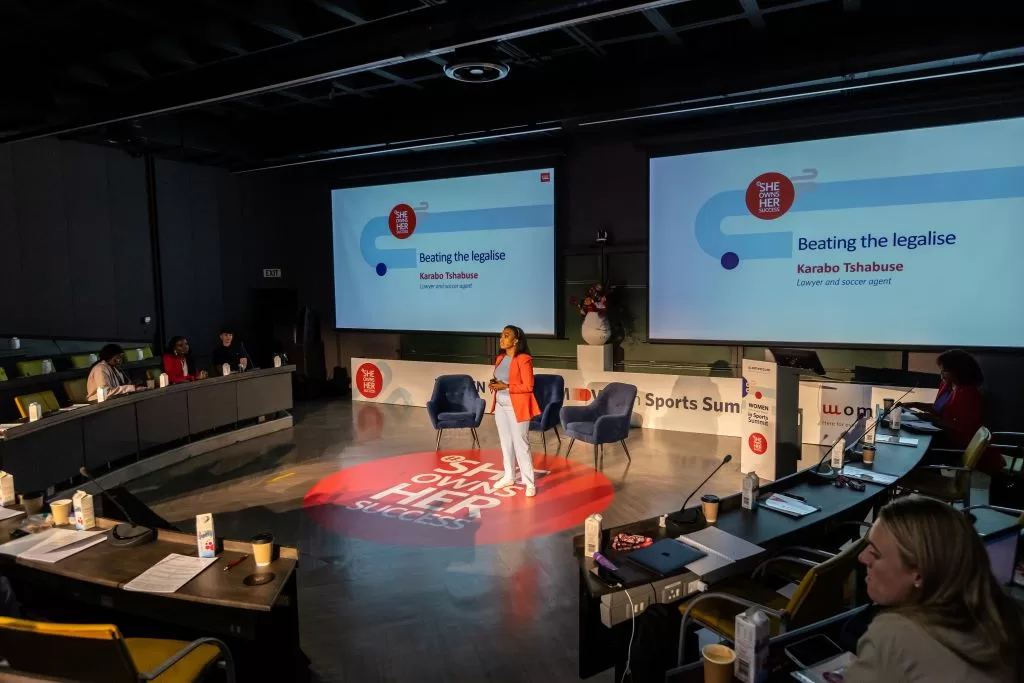Take charge of your contracts – and be the boss of your own game
At the Momentum’s Women Who Make Moves in Sports Summit, lawyer and sports agent Karabo Tshabuse was one of the speakers empowering sportswomen. She explains the importance of knowing how to negotiate better contracts – and get what you’re worth.
A startling 66% of football players at the Fifa Women’s World Cup had to take unpaid leave or put in vacation time to represent their countries on the global stage. This also while the salary of an average male Springbok Sevens rugby player could cover the costs for the entire women’s Sevens team. These staggering stats compiled by Nqobile Ndlovu, director of sports research company Cash N Sport, don’t only illuminate the gender pay gap that still exists in sport – they also bring home the importance of empowering our female athletes to fight for change.

At Momentum’s inaugural Women Who Make Moves in Sports Summit – an exclusive event held from 8-9 August and attended by top female athletes from across the country – women were empowered with vital skills and tools that can support them in leveraging their sporting talents to better position themselves for sponsorship opportunities. As Africa’s first female Fifa accredited Players’ Agent, I wanted to share my advice on reading and negotiating sporting contracts, from signing with an agent to becoming a brand ambassador. After all, you are the boss – and the higher you go, the more you have to take yourself seriously.

Agent contracts
The player-agent relationship is a very personal one based on trust. You are telling a story with your career – and the agent’s job is to promote it. Even if you are desperate to sign a contract, remember that you will have to honour what you sign, so make sure you are comfortable with the terms. What should an athlete look out for when approached by an agent? Here are my guidelines:
Remember that you don’t have to accept the standard terms of an agreement. If an agent approaches you, that means they want to sign you – you are sought-after and, as the client, you will be the agent’s boss. Know your worth and tailor-make your provisions. Agents must work in your best interests, so don’t be afraid to ask for what you want.
Beware of exclusivity. A lot of agents want exclusive rights to represent an athlete but that can bring challenges. You want to keep your options open to work with different experts, for instance a booking agent or a sponsorship agent. Different people specialise in different fields and non-exclusivity means you can negotiate for the best deals from everyone.
Negotiate the agent renumeration – it doesn’t have to be an automatic 10%. You can negotiate and structure your terms, for instance, if they find you a deal or if you find a deal yourself, the renumeration structures should be different. Also make sure you put strict payment terms in place for payments due to you, for instance, will you be paid before or after appearances, in lump sums or monthly payments? Put all the details on paper so there is always clarity around your finances.
Be clear about your agent’s mandate. Remember, an agent can enter into legal and binding agreements in your name if you authorise them to, so make sure the negotiations always have your final and literal sign-off. That way you stay in control and the agent doesn’t have carte blanche to do whatever they want on your behalf.
Negotiate the terms of termination. You should be able to terminate your agent’s contract for a breach or for non-performance and not just for death or injury, which are the typical agent contracts.
Sponsorship contracts
In South Africa, the terms “endorsement” and “sponsorship” are mostly used interchangeably, but there are subtle legal differences. An endorsement is when a brand is so closely associated with an athlete that they are almost synonymous, for instance Michael Jordan and Nike. True endorsements are rare and unique.
Sponsorship, on the other hand, is when a corporate funds a team or a player in return for brand advocacy. As your star rises, you will have more bargaining power – so what should you be aware of when you are approached by a brand? I advise the following:
Make sure you are aligned with the sponsor’s entitlement and the fee you’ll get – what do they want, and what do you get? You should be clear about all the entitlements and exclusions involved, for instance, could you start your brand? Who do they see as competitors, even if you don’t? What happens if your friend in the photo with you is wearing a competitor brand? Insist on a schedule page to the sponsorship contract that lists the details of what is allowed and expected.
Be clear about the fee structure. How and when will you be paid? In a lump sum or per performance? Before or after?
Look out for conflicts. Pulling out of a contract or competing with your sponsor will harm your reputation, so be open from the start about your goals.
Include details on what will happen if you suddenly can’t perform. Be clear about modifications and amendments to your deal if you can’t meet your sponsor’s expectations, for instance if you are called up for the national team and can’t appear at a sponsor’s event. Be precise about cancellation terms and fees.
Personal service contracts
A personal service contract could be an employment contract with a club or a contract with the government when you get a national call-up. To negotiate the best deal for yourself, you need to understand your goals and what you would like to achieve. Know the power of collaboration – working with your team will give you all more opportunities for leverage and to create a win-win situation for everyone. Also remember to negotiate the use of your personal image.
With all contracts, you need to get the basics right. Know what you want and build a competent team around you. This includes financial experts, who can help you navigate the best payment terms for your goals. Having a good team around you adds a layer of expertise and protection and ensures you are taken seriously. Always seek advice before signing anything and remember – you don’t give your bare minimum on the field, so why should you accept the bare minimum in your contracts?





























